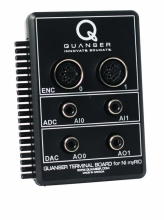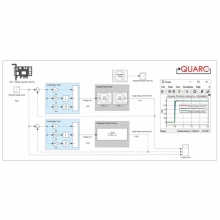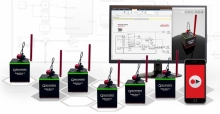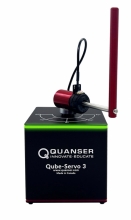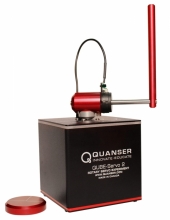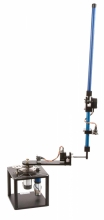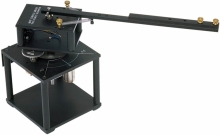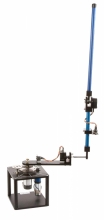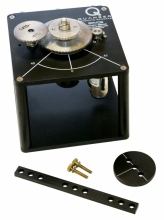The Quanser Terminal Board for NI myRIO connects an NI myRIO device to Quanser control plants. It has two analog inputs, two analog outputs, and two single-ended encoder input interfaces. You can access all inputs and outputs simultaneously using unbuffered single-point reads and writes, which is ideal for real-time control.
Quanser
The global standard in transformational engineering labs for Controls, Robotics, and Mechatronics, optimized for the academic setting.
Academic institutions trust Quanser to strengthen their reputation through transformative teaching and research labs that accurately replicate theories and bring engineering mathematics and concepts to life.
“We are in a golden age of engineering education. There’s a lot to be excited about and a lot to be challenged by. The education we offer students must capture this momentum and help them realize their potential.”
– Paul Gilbert, CEO, Quanser
-
-
QUARC™ is the most efficient way to design, develop, deploy and validate real-time applications on hardware using Simulink®. QUARC generates real-time code directly from Simulink-designed controllers and runs it in real-time on the Windows target – all without digital signal processing or without writing a single line of code.
-
Quanser's Qube Teaching Studio features cutting-edge hardware, software, digital replicas, and a mobile app, so educators gain a complete teaching package. The Qube-Servo 3, known for reliability and performance, forms the foundation of hands-on learning. The digital-twin technology offers virtual accessibility, freeing students from lab constraints. Supported by QUARC and Quanser APIs, seamless control system development across platforms is ensured. Complemented by the 'Experience Controls' digital textbook, instructors access interactive resources for an unparalleled teaching experience.
-
The Quanser Qube-Servo 3 is a portable, fully integrated servomotor platform designed specifically for teaching control concepts at the undergraduate level. The system is equipped with a high-quality direct-drive brushed DC motor, two encoders, an internal data acquisition system, and an amplifier.
-
The Quanser QUBE™-Servo 2 is a fully integrated, modular servomotor lab experiment designed for teaching mechatronics and control concepts at the undergraduate level.
-
The Rotary Double Inverted Pendulum module is ideal to introduce intermediate and advanced control concepts, taking the classic single inverted pendulum challenge to the next level of complexity. You can use it to demonstrate real-world control challenges related, for example, to takeoff stabilization of a multi-stage rocket. The Rotary Double Inverted Pendulum module attaches to the Rotary Servo Base Unit.
-
The Rotary Flexible Joint module is ideal for modeling a flexible joint on a robot when mounted on the Rotary Servo Base Unit. It is also useful in the study of vibration analysis and resonance. This experiment uses a sensor to measure joint deflection, to address the control problems encountered in large, geared robot joints where flexibility is exhibited in the gearbox. Students will learn how to model the system using state-space and design a feedback controller with pole-placement.
-
The Rotary Flexible Link module is designed to help students perform flexible link control experiments. The module is designed to be mounted on the Rotary Servo Base Unit. This experiment is ideal for the study of vibration analysis and resonance and allows us to mimic real-life control problems encountered in large, lightweight structures that exhibit flexibilities and require feedback control for improved performance. The experiment is also useful when modeling a flexible link on a robot or spacecraft.
-
The Rotary Double Inverted Pendulum module is ideal to introduce intermediate and advanced control concepts, taking the classic single inverted pendulum challenge to the next level of complexity. You can use it to demonstrate real-world control challenges related, for example, to takeoff stabilization of a multi-stage rocket. The Rotary Double Inverted Pendulum module attaches to the Rotary Servo Base Unit.
-
The Rotary Servo Base Unit is the fundamental element of the Quanser Rotary Control experiments. It is ideally suited to introduce basic control concepts and theories on an easy-to-use and intuitive platform. Use it on its own to perform several experiments, or expand the scope of this unit by adding on other modules to teach an even wider range of control concepts.

